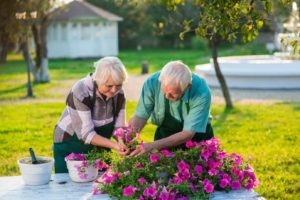
According to recent research, getting your hands dirty in the garden may have positive effects on your physical and mental well-being as a result. As long as you live alone or in a care home, gardening is a great way to stay active. It also provides the following benefits to our beloved seniors:
Stimulates the mind
Although gardening is mentally engaging in various ways and pushes you to practice being present, there’s no harm in including a stone fountain for your garden to improve its ambiance.
A sense of responsibility and control may be gained via gardening since you must pay attention to the specific needs of different plants and the conditions that will help your garden develop.
We feel successful when we can see the results of our efforts in the form of plants and gardens. Each plant requires a tiny portion of your attention, and watching it bloom may be incredibly reassuring.
Gardening, sometimes known as horticulture therapy, has been shown to lower blood pressure, promote sleep, and aid in treating dementia.
It’s even a terrific way to chat to neighbors and discuss ideas with other gardeners, and it necessitates visits to farmer’s markets and garden centers on occasion.
Promotes better bone health
One of the body’s basic nutrients is Vitamin D. It stimulates bone development in foods such as milk and fish.
Seniors who garden expose their bodies to sunshine, which helps them naturally synthesize vitamin D, enhancing their bone health and metabolic functioning.
A lack of Vitamin D, on the other hand, might have a severe influence on a senior’s health.
Vitamin D deficiency is linked to bone loss, muscle weakness, fractures, and falls. A severe fall might not only be debilitating for seniors, but it can also influence their sense of freedom and self-esteem.
Seniors should be cautious while gardening in the heat, guarding themselves against skin burns and dehydration.
When gardening, elders may protect themselves from the dangerous effects of sunshine by using high-quality sunscreen, wearing a wide-brimmed hat, and staying hydrated with water.
Encourages social opportunities
Many elders appreciate the companionship of their friends, family, and relatives. It is important to remember that social contacts may be therapeutic, so seniors might benefit from caretakers.
Isolation leads to loneliness, which is detrimental for elders. Seniors who socialize have improved health and live longer than their colleagues who live alone.
Community gardens provide elders with social opportunities by giving them a place to meet and engage with new and old acquaintances.
It also contributes to the joy of producing healthy crops while beautifying the area.
Eating better produce
Another advantage of spending time in the garden is the natural vegetables. Growing and collecting fresh and organic fruits and vegetables, herbs, and chicken eggs make an intellectually stimulating activity even more enticing.
Gardening provides elders with a lot of self-sufficiency. There will be no need to organize costly flower delivery, nor any last-minute grocery store runs when you run out of herbs.
The garden provides a great source of nutrition for seniors and a convenient and low-cost supply of fruits, herbs, and vegetables, which are the building blocks of a well-balanced diet.
This is particularly critical for the elderly, who are more vulnerable to nutritional deficits and likely to be on a fixed income.
Summary
Retirement doesn’t imply that your monthly bingo game is the most fascinating thing in your life. It’s a fantastic time to start a new interest or rekindle an old one.
Gardening is a dynamic alternative full of year-round changes, surprises, and difficulties, ideal for seniors of all ability levels.